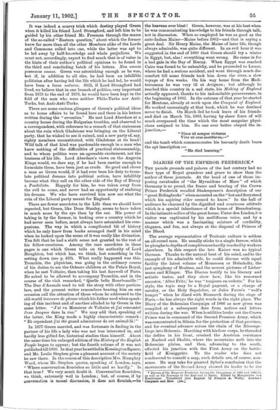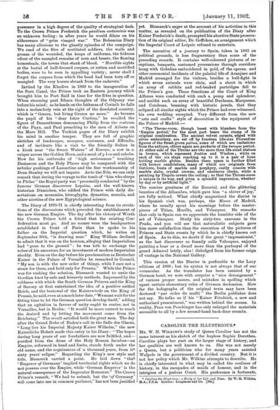DIARIES OF THE EMPEROR FREDERICK.* THE parade grounds and palaces
of the last century had no finer type of Royal grandeur and grace to show than the author of these journals. At the head of one of those im- posing cavalcades of "the Myrmidons of Mars" of which Germany is so proud, the frame and bearing of the Crown Prince Frederick recalled Shakespeare's description of our "great Bolingbroke " when mounted on the "hot and fierysteed which his aspiring rider seemed to know." In the hall of audience he charmed by the dignified and courteous attitude which is a special inheritance of the house of Brandenburg. In the intimate milieu of the great house, Unter den Linden, tl visitor was captivated by his mellifluous voice, and by a manner which was a fascinating mixture of cordiality, elegance, and fun, not always at the disposal of Princes of the Blood.
The average representative of Teutonic culture is seldom an all-round man. He usually sticks to a single furrow, which he ploughs to depths of completeness hardly reached by workers elsewhere. In this respect the late Kaiser was no typical German. Thanks to the natural bent of his mind, and to the example of his admirable wife, he could discuss with equal facility the latest volume of Mommsen or Helmholtz, the last symphony of Brahma, and the newest pictures of Lieber- mann and Klinger. The Diaries testify to his literary and artistic tastes, and they show how, like his renowned ancestor, ' Alter Fritz,' he was " toujours en vedette." For his style, the topic may be a Royal pageant, or a charge of cavalry, or the Holy Sepulchre, or Jules Favre's " wolf's hunger" when he dined with Bismarck during the siege of Paris,—he has always the right words in the right place. The Diary of the Bohemian Campaign of 1866 as now given was compiled at a subsequent date from notices and letters written during the war. When hostilities broke out the Crown Prince was in command of the Second Prussian Army, which was concentrated in Silesia for the protection of that province, and for eventual advance across the chain of the Riesenge- birge into Bohemia. Marching with his four corps, he threaded the defiles in his front, crushed the Austrian resistance at Nachod and Skalitz, where the mountains melt into the Bohemian plains, and then, advancing to the south, effected his junction with the First Army on the battle- field of Koniggratz. To the reader who does not condescend to consult a map, such details are, of course, non- sense. He may take for granted Sybel's conclusion that the movements of the Second Army showed its leader to be the
• Diaries of the Emperor Frederick during the Campaigns of IMO and 1870-71, as welt as his Journeys to the East and to Spain. Edited by Margaretha von Posehinger. Translated into English by Frances A. Welby. London Chapman and Hall. 0.2s.] poratessor in a high degree of the quality of strategical dash. To the Crown Prince Frederick the gaudium certaniinis was an unknown feeling : in after years he would dilate on his abhorrence of "grim visaged war." The Bohemian Diary has many allusions to the ghastly episodes of the campaign. We read of the files of mutilated soldiers, the wails and groans • of the wounded, the heaps of uniforms, the hideous odour of the mangled remains of men and beasts, the flaming homesteads, the towns that stank of blood. " Horrible sights at the burial of half-dressed corpses, or rotten and mortified bodies, were to be seen in appalling variety ; never shall I forget the corpses from which the head had been torn off or mangled. The very horses shrank from the cadavers."
Invited by the Khedive in 1869 to the inauguration of the Suez Canal, the Prince took an Eastern journey which brought- him to Port Said in time for the fetes in question. When steaming past Ithaca thoughts of the Odyssey rise before his mind ; as he lands on the Isthmus of Corinth he falls into a melancholy vein at the sight of the desolated country, which is " Greece, but living Greece no more." As became the pupil of • his " dear tutor Curtius," he recalled the figure of Demosthenes denouncing Philip from the rostrum of the Pnyx, and Paul preaching to the men of Athens on the Mars Hill. The Turkish pages of the Diary exhibit his mind in another temper. They are full of graphic sketches of landscapes, mosques, costumes, and Effendis, and of incidents like a visit to the friendly Sultan in a kiosk near "the Sweet Waters" of Europe, a row in a calque across the Golden Horn, and a meal of p 1 iu and cabobs. How far his outbreaks of " high seriousness " touching Dariascus and the Holy Places may be compared with the nebular gushings of Lamartine and the fine workmanship of Dean Stanley we will not inquire. As to the Nile, we can only remark that during the voyage to the tomb of "him who sleeps in Philae " the Royal party was "personally conducted " by the famous German discoverer Lepsius, and the well-known historian Diimichen, who edified the Prince with daily dis- sertations on mummies, hieroglyphs, dynasties, scarabs, and other niceties of the new Egyptological science.
The Diary of 1870-71 is chiefly interesting from its revela- tions of the discussions which preceded the establishment of the new German Empire. The day after his victory of Worth the Crown Prince told a friend that the existing Con- federation must go. And no sooner were the haadquarters established in front of Paris than he spoke to his father on the Imperial question which, he • writes on September 30th, "is drawing near." King William declined to admit that it was on the horizon, alleging that Imperialism had " gone to the ground " : he was loth to exchange the robes'of his ancestors for an investment of modern Imperialist shoddy. Even on the day before his proclamation as Deutscher Kaiser in the Palace of Versailles he remarked in Council, "My son is with the new order of things, while I care not a straw for them, and hold only for Prussia." While the Prince was for rushing the solution, Bismarck wanted to untie the Gordian knot by safe and leisurely methods. Impressed by the coldness with which the South German Princes and the King of Saxony at first entertained the idea of a positive unified Reich, and the bestowal of the Kaiserwurde on the King of Prussia, he said, even at a much later date, " We must wait for the fitting time to let the German question develop itself," adding that an agitation in favour of unity ought to centre, not in Versailles, but in Berlin : " It would be more correct to reach the desired end by letting the movement come from the Reichstag." The result satisfied both the great men. The day after the Grand Duke of Baden's call in the Salle des Glaces, "Long live his Imperial Majesty Kaiser Wilhelm," the new Kaiserliche Hoheit made this entry in his Diary : " The hopes during long years of our forefathers are now fulfilled, and— purified from the dross of the Holy Roman Incubus—an Empire, reformed in head and limbs, stands forth under the old name, and the cognizances of a thousand years, from its sixty years' eclipse." Regarding the King's new style and title, Bismarck carried a point. He laid down " that Emperor of Germany' implied territorial rights which we do not possess over the Empire, while German Emperor' is the natural consequence of the Imperator Romanus." The Crown Prince's remark, " We had to submit, but the 'of Germany' will come into use in common parlance: has not been justified
yet. Bismarck's anger at the account of his activities in this matter, as revealed on the publication of the Diary after Kaiser Frederick's death, prompted his abortive State prosecu- tion of its original editor, Dr. Geffcken, an arraignment which the Imperial Court of Leipsic refused to entertain.
The narrative of a journey to Spain, taken in 1883 on political grounds, is leas fragmentary than some of the preceding records. It contains well-coloured pictures of re- ceptions, banquets, costumed processions through corridors hung with Gobelins embroidered in gold, of the operas, and other ceremonial incidents of the palatial life of Aranjuez and Madrid arranged for the visitors, besides a bull-fight in which seven animals were slain, and a shoot in which an army of rabbits and red-beaked partridges fell to the Prince's gun. These functions of the Court of King Alfonso were conducted with such a pomp and splendour, and amidst such an array of beautiful Duchesas, Marquesas, and Condesas, beaming with historic jewels, that they eclipsed all similar sights which the Prince had ever witnessed.
his own wedding excepted. Very different from the new "arts and crafts" style of decoration is the equipment of the Palace of Madrid :—
"The Throne-room, though beset with blunders from the `Empire period,' for the most part bears the stamp of its original combination. The ancient velvet carpets, edged with silver embroidery, are set off by fourteen life-size Florentine figures of the finest green patina, some of which are imitations from the antique, others again are products of the baroque period. At either side of the Throne are two more than life-sized statues in bronze, which represent Justice and Wisdom ; while on each of the six steps reaching up to it is a pair of lions holding marble globes. Besides these space is further filled with bronze candelabras, many of which are originals from Gutierre, busts of marble and porphyry, costly consoles with marble slabs, crystal crowns, and enormous clocks, while a painting by Tiepolo covers the ceiling ; so that the Throne-room is unique in its way, and gives a splendid impression, whether by day or by artificial light."
The sombre greatness of the Escorial, and the glittering beauties of the Anambra, which gave him " a shiver of joy,"
are fully noticed. What chiefly magnetised the diarist in his Spanish visit was, perhaps, the Museo of Madrid, where he usually spent his mornings before the master-
pieces of Titian, Murillo, and Velazquez. He remarks that cnly in Spain can we appreciate the humbler side of the art of Velazquez. Study his sixty-two canvases in the Prado, and you will see that naturalistic subjects gave him more satisfaction than the execution of the pictures of Princes and State events by which he is chiefly known out of Spain. As to this, we doubt if the great " impressionist," as the last discoverer so funnily calls Velazquez, enjoyed painting a boar or a dwarf more than the portrayal of the grand Admiral lately, alas ! dislodged from his former coign of vantage in the National Gallery.
This version of the Diaries is preferable to the Lucy editions of 1888 ; but its syntax is not always that of our vernacular. As the translator has been assisted by a German hand, we note with surprise a "nice derangement" of various proper names, and mistakes in spelling which upset certain elementary rules of German declension. How far the holographs of the original texts may have been doctored "par ordre du mufti " the Berlin publisher does not say. He talks as if his " Kaiser Friedrich, a new and authorised presentment," was written behind the scenes. In reality, Frau von Poschinger has only enlarged the materials accessible to all by a few second-hand back-door crumbs.







































 Previous page
Previous page